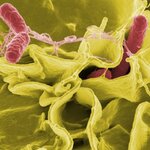
Synthetic biology uses genes as interchangeable parts to design cellular circuits that can perform new functions, such as sensing environmental conditions. But their complexity is limited by a critical bottleneck: the difficulty in assembling genetic components that don't interfere with each other.
Unlike electronic circuits on a silicon chip, biological circuits inside a cell cannot be physically isolated from one another. Because all the cellular machinery for reading genes and synthesizing proteins is jumbled together, researchers have to be careful that proteins that control one part of…

